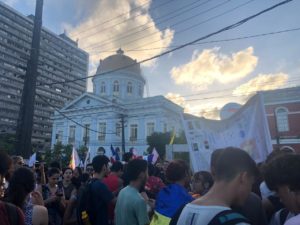 In recent weeks, Bolsonaro’s government has invested systematically in attacks on Brazilian public universities. The modus operandi follows the same pattern: when they need support for an idea that sounds absurd, first, they throw out fake or exaggerated news about that and make people develop hatred over it. This time, they said that the Universities were places of «mess» (balbúrdia) and drug use and taxpayers should not spend their money on it.
In recent weeks, Bolsonaro’s government has invested systematically in attacks on Brazilian public universities. The modus operandi follows the same pattern: when they need support for an idea that sounds absurd, first, they throw out fake or exaggerated news about that and make people develop hatred over it. This time, they said that the Universities were places of «mess» (balbúrdia) and drug use and taxpayers should not spend their money on it.
Immediately, images of protesting nude people appeared while the texts underneath it stated that those protests would be in universities. Thus, an arsenal of supporters (and robots) contributed to the spread on social media and, soon, a portion of the population turned against public universities.
In addition to the lies about student behavior, they also invented information about universities supposedly not producing science, or not producing enough; still, they said that most of the students would be from middle and upper classes. According to the Brazilian Science Academia (ABC), 95% of the science production in Brazil come from public universities. Also, according to research conducted by the National Association of Directors of Federal Institutions of Higher Education (Andifes), 2 thirds of the public universities’ students come from classes D and E.
Following the fake news and the attack on the university image, came the budget cuts. According to the UOL Educação (Brazilian website), MEC contingent about R $ 5.8 billion of the budget, reaching resources ranging from pre-school to post-graduation. Even the National Museum, hit by a major fire last year, suffered cuts in its budget for reconstruction.
Some universities have warned that they will not have enough budget to keep basic spending like energy, cleanliness and conservation in the next six months. They will probably have to stop their activities. Graduate programs are afraid of running out of resources to pursue research that already has a low investment.
The situation of the universities is complicated for some years now. In the Dilma and Temer’s governments the resources were cut and it was already possible to see the deterioration of the buildings and the lack of funds for everything. Therefore, the cuts perpetrated by Jair Bolsonaro are being the last fatal blow in public education.
To stand against these cuts, thousands of people took the streets on May 15. There were more than 200 cities in all Brazilian states and DF in support of public universities. In the city of Recife, where I participated of the protest, it was possible to see children, young people, adults, elderly people, university employees, students, supporters of all classes in march screaming for the end of the absurd. There were also groups organized by leftist parties and social movements such as the MST and CUT. However, the movement was able to join those who are affiliated with parties, social movements and, also, people who voted in Bolsonaro and regret this now.
There were so many people in such a strong movement that the government should come back after its decision. However, what the President did was to call on his supporters to go on one march last Sunday 26 in support of his decisions. The result was a few thousand people, typical Bolsonaro’s supporters, walking in protest against … education! In the city of Curitiba, a group removed a banner hanging in front of a UFPR building that said «In defense of education» on the grounds that on public buildings should not be hung ideological bands (SIC). Apparently, the only ideology possible today in Brazil is the ideology of the absurd.
The result of the Sunday marches is still being measured. Other mottos of the protest were against part of the Congress, known as «centrão» and against the STF, the highest Court of Brazilian Judiciary. Because of this, congressmen and congresswomen fear that the manifesto convened by Bolsonaro has further aggravated the Brazilian political crisis. What the president was able to do was to inflame his audience of retinues even more against the institutions of Congress and STF, and, of course, he was able to separate Brazil even more.
